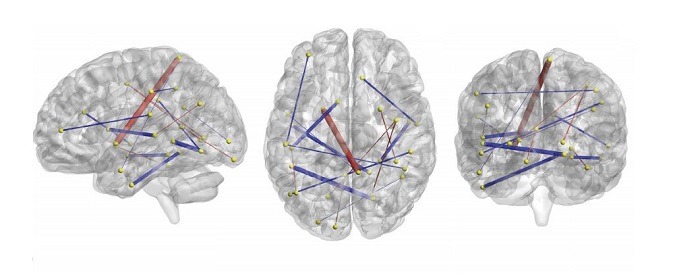Study combines neuroimaging with machine learning to predict, with 96% accuracy, whether high-risk 6‑month-old babies will develop autism spectrum disorder (ASD) by age 2

Researchers use brain imaging and machine learning to predict which high-risk infants will develop autism. Credit: Carolina Institute for Developmental Disabilities.
—
A Single Brain Scan Has Been Used to Accurately Predict Autism at Just 6 Months Old (Science alert)
“Researchers have used brain scans and artificial intelligence to spot differences in how key areas of infant brains synchronise, allowing them to accurately predict which babies would develop autism spectrum disorder (ASD) as a toddler…The research, led by scientists from the University of North Carolina at Chapel Hill and Washington University, comes hot on the heels of an earlier study that used two scans taken at 6 and 12 months to make a similar prediction.
Not only has this new method reduced the number of scans required to make the judgement, they were able to predict with more than 96 percent accuracy which 6 month old infants would be diagnosed with autism by age 2, compared to 81 percent previously…The researchers used magnetic resonance imaging to analyse the neural activity of 230 regions across the brain in 59 infants who had at least one older sibling with a diagnosis of ASD…
A larger sample size and more data will no doubt help determine just how accurate this method of diagnosis could be in the long term, which is what the researchers are planning next.
It’s also unlikely that a single test will form the basis of any future diagnoses – more likely, it would form one piece in a risk profile informed by research involving a variety of evaluations.”
The Study
Functional neuroimaging of high-risk 6‑month-old infants predicts a diagnosis of autism at 24 months of age (Science Translational Medicine)
- Summary: In a new study, Emerson et al. show that brain function in infancy can be used to accurately predict which high-risk infants will later receive an autism diagnosis. Using machine learning techniques that identify patterns in the brain’s functional connections, Emerson and colleagues were able to predict with greater than 96% accuracy whether a 6‑month-old infant would develop autism at 24 months of age. These findings must be replicated, but they represent an important step toward the early identification of individuals with autism before its characteristic symptoms develop.
- Abstract: Autism spectrum disorder (ASD) is a neurodevelopmental disorder characterized by social deficits and repetitive behaviors that typically emerge by 24 months of age. To develop effective early interventions that can potentially ameliorate the defining deficits of ASD and improve long-term outcomes, early detection is essential. Using prospective neuroimaging of 59 6‑month-old infants with a high familial risk for ASD, we show that functional connectivity magnetic resonance imaging correctly identified which individual children would receive a research clinical best-estimate diagnosis of ASD at 24 months of age. Functional brain connections were defined in 6‑month-old infants that correlated with 24-month scores on measures of social behavior, language, motor development, and repetitive behavior, which are all features common to the diagnosis of ASD. A fully cross-validated machine learning algorithm applied at age 6 months had a positive predictive value of 100% [95% confidence interval (CI), 62.9 to 100], correctly predicting 9 of 11 infants who received a diagnosis of ASD at 24 months (sensitivity, 81.8%; 95% CI, 47.8 to 96.8). All 48 6‑month-old infants who were not diagnosed with ASD were correctly classified [specificity, 100% (95% CI, 90.8 to 100); negative predictive value, 96.0% (95% CI, 85.1 to 99.3)]. These findings have clinical implications for early risk assessment and the feasibility of developing early preventative interventions for ASD.


